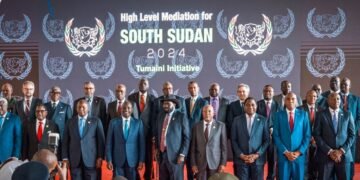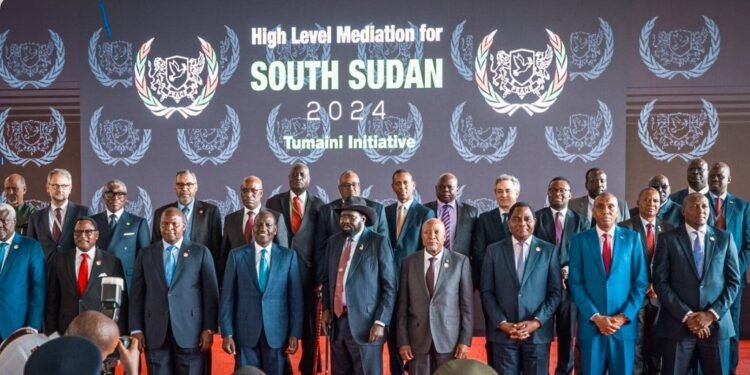The Tumaini Initiative is a significant peace mediation effort for South Sudan, launched in Nairobi, Kenya, in May 2024. Here’s a more detailed exploration:
Background and Launch:
- Origins: The initiative was born out of the need to include holdout groups that did not sign the 2018 Revitalized Agreement on the Resolution of the Conflict in South Sudan (R-ARCSS), aiming for a more comprehensive and inclusive peace process.
- Leadership: Kenyan President William Ruto, alongside South Sudan President Salva Kiir, spearheaded this peace initiative, with Major-General Lazarus Sumbeiywo serving as the chief mediator.
Objectives:
- Inclusivity: One of the primary goals of Tumaini is to bring all relevant parties, including opposition groups and civil society, into the peace process to ensure that no stakeholder is left out, thereby fostering a broader consensus.
- Addressing Root Causes: The initiative focuses on tackling deep-seated issues like ethnic conflicts, political power struggles, resource distribution, and security sector reform to achieve sustainable peace.
- Peace Implementation: It aims to complement or possibly supersede previous agreements by establishing new protocols for ceasefire, disarmament, governance reforms, and a new constitutional framework.
Key Developments:
- Declaration of Commitment: On May 16, 2024, various parties signed a “Declaration of Commitment,” renouncing violence and pledging to work towards peace through dialogue.
- Eight Protocols: By July, significant progress was made with the initial agreement on eight protocols covering security arrangements, ceasefire mechanisms, and governance structures.
- Challenges: The initiative has faced hurdles, including the withdrawal of the Sudan People’s Liberation Movement-in-Opposition (SPLM-IO) in July 2024, citing concerns over the initiative’s alignment with the 2018 peace agreement. There have also been disagreements over the integration of opposition into the transitional government and the timeline for upcoming elections.
Reactions and Perspectives:
- Local Support and Skepticism: While many South Sudanese and civil society groups see Tumaini as a beacon of hope, there’s also skepticism regarding its implementation, given the history of peace agreements that have not led to lasting peace.
- International and Regional Dynamics: Kenya’s role in the initiative underscores its influence in regional peace processes, aiming to rival Ethiopia’s position in the Horn of Africa. The international community, including the Troika (Norway, the U.S., and Britain), has shown support but remains cautious, urging tangible progress.
Current Status:
- Ongoing Negotiations: The peace talks have seen several pauses and resumptions, with the latest in November 2024. The focus has been on concluding the responsibility-sharing protocol and aligning the Tumaini outcomes with the existing peace framework.
- Implementation Concerns: There’s a critical view that while the initiative has a promising framework, the real test will be in the implementation of its provisions, especially given South Sudan’s history of slow or partial implementation of peace agreements.
Future Implications:
- If successful, Tumaini could pave the way for South Sudan’s first democratic elections since independence, potentially leading to a more stable and inclusive governance structure. However, the ongoing need for compromise, political will, and external support remains vital for its success.
The Tumaini Initiative thus stands at a crossroads, with the potential to either significantly advance peace in South Sudan or become another in a series of well-intentioned but ultimately unfulfilled peace efforts.












